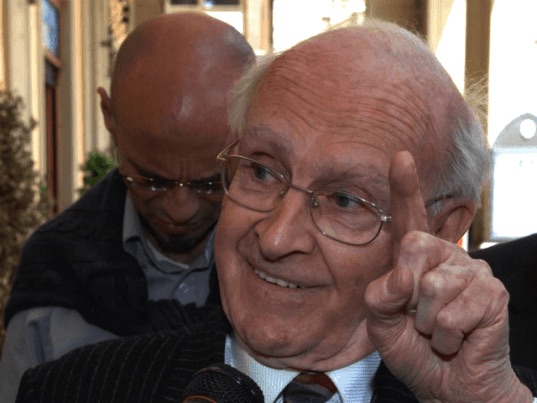Six years ago today, three months before what would have been his 90th birthday, the great revisionist historian Prof. Robert Faurisson died at his home in Vichy, France, minutes after returning from speaking at his final conference – an event in Shepperton (the Professor’s birthplace) organised by Heritage and Destiny magazine.
As we remember the Professor six years on, we are also conscious (as he certainly would have been had he still been with us) of the impending 80th anniversary of the capture of Auschwitz by Soviet forces. This capture on 27th January 1945 became the basis for a new secular religion of ‘Holocaustianity’ – the myth of the six million who supposedly perished in alleged homicidal gas chambers.
On its 50th anniversary in 1995, Prof. Faurisson wrote an essay ‘Auschwitz: the facts and the legend’, which forms part of a vast archive of his work in several languages, now available online.
As I recently noted, secret police documents from an infiltration of the British National Party during the early 1990s spelled out the political as well as academic importance of revisionism. In the words of a police spy inside the BNP, known now only as HN 56:
“…The ‘bogey’ always thrown at nationalism and at nationalists, in attempts to stifle not only its growth but its acceptance as well, was the spectre of the Holocaust. Until this ‘bogey’ was laid to rest or put into its proper context (by accepting recent research by noted historians, such as David Irving and others, into the actual numbers and nationalities of those killed in the death camps, in particular Auschwitz), then this ‘bogey’ will always be used by those who see nationalism as a threat, to scare off people who would otherwise embrace the nationalist ideals.”
The continuing relevance of historical revisionism in the 2020s has been demonstrated by events as diverse as the arrest and deportation of the French scholar Vincent Reynouard, whose case has been chronicled here over the past two years, to the ongoing battle by governments of both parties to change English law so as to build a vast ‘Holocaust memorial and learning centre’ in the heart of Westminster.
Those who doubt the extent of the subversive networks involved in generating Holocaust mythology should also reflect on the strange background of the ‘undercover journalist’ whose infiltration of racial realist and ‘right wing’ networks will be broadcast this evening (21st October).

Far from the brave and naive young journalist depicted, this spy is descended on both sides of his family from highly influential characters in British and European espionage history. His relatives include a half-Jewish Spanish diplomat who provided 30,000 illegal visas for wartime Jews. The true story of Jewish espionage and criminal networks before, during, and after the Second World War has been repeatedly obscured, and even wilfully ignored by 21st century nationalists who think that if they don’t mention Jews, the problem will go away. It won’t.
Professor Robert Faurisson stepped away from a highly successful academic career and put his life on the line, in order to pursue what he termed “the great intellectual adventure” of revisionism. That adventure continues, and the efforts of our enemies to demonise our cause (or to smother it under the crushing weight of multimillions of pounds, dollars and euros spent on memorials and museums) will only add fuel to the fire and spark the curiosity of new generations.




